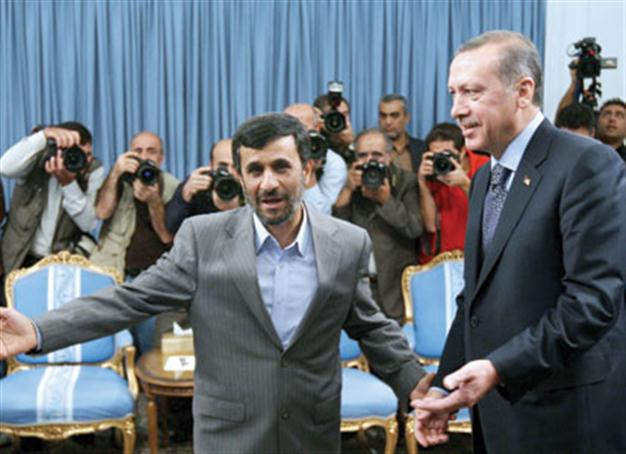
Iranian President Mahmoud Ahmadinejad walks with Turkish Prime Minister Recep Tayyip Erdoğan. AFP Photo
Iran and the Western powers should engage in a new round of dialogue to solve their problems over Tehran’s controversial nuclear program, according to Ankara, who is openly against military action in the region.
Turkey’s advice came on the day when the United Kingdom and France called on tougher sanctions against Iran in the light of the U.N. nuclear watchdog’s latest report, which that said Iran appeared to have worked on designing an atomic bomb.
“We are constantly advising both sides to solve their problems peacefully and through dialogue,” a senior Foreign Ministry official told the Hürriyet Daily News yesterday. Turkey’s Foreign Minister Ahmet Davutoğlu has expressed Turkey’s views and recommendations to his Iranian counterpart Ali Akhbar Salehi and EU’s Catherine Ashton in his meetings.
The issue will also be on Turkey’s agenda next week when French Foreign Minister Alain Juppe will pay a visit to Turkey on Nov. 17 and 18.
The official said Turkey was still evaluating the International Atomic Energy Agency (IAEA) report and that it was still too early to comment on its content. “We have two main principles: We are against the proliferation of any sort of these weapons of mass destruction in our region and in the world. Secondly, we believe these problems must be solved peacefully as one can see it in our past efforts,” the official recalled.
Turkey played an important role in an unfinished swap deal for enriched uranium between Iran and the Western powers in late 2009 and early 2010 in an effort to diffuse the tension. Later it voted against a U.N. Security Council resolution imposing sanctions against Iran in an indirect protest of Western powers, mainly the United States, who overlooked Turkey’s efforts in this process.
When recalled that the United Kingdom and France were pressing for more sanctions while Russia, another permanent member of the U.N. Security Council, closed doors, the official said Turkey would make its evaluations after seeing what would be these sanction and how the Security Council would decide. “It’s very obvious that certain countries are pushing for sanctions. We will surely closely follow developments.”
Besides growing diplomatic tension between Iran and the West, Turkey is also concerned with the timing of the release of the IAEA’s report and international media’s reports on possible military action against Iran. “The fact that these discussions coincided with the UN report is very much attention grabbing,” Turkish official said without further elaborating.
Turkey’s ties with Iran deteriorated following its decision to deploy an early warning radar system in its territories as part of NATO’s missile defense project, which the U.S. claims targets potential Iranian nuclear capability. The two countries are also in different camps on Syria, whose leadership is using all military means to crack down on protesters.